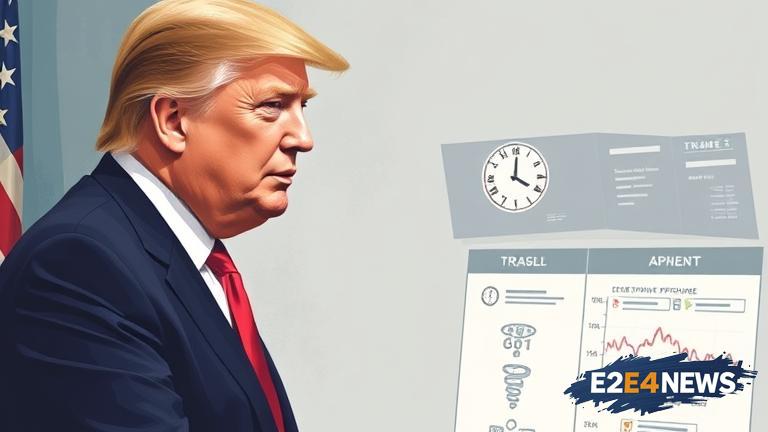The Trump administration has introduced a new health tracking system aimed at monitoring and improving public health outcomes. However, the system has sparked controversy over its potential to compromise patient privacy and data security. The system, which is designed to track patient health data, has been criticized for its lack of transparency and oversight. Many experts have raised concerns that the system could be used to collect and store sensitive patient information without their consent. This has led to fears that the data could be misused or exploited by third parties. The system’s implementation has also been criticized for its potential to disproportionately affect vulnerable populations, such as low-income communities and minority groups. Furthermore, the system’s reliance on digital technology has raised concerns over its accessibility and usability for patients with limited technological proficiency. Despite these concerns, the Trump administration has defended the system, citing its potential to improve public health outcomes and reduce healthcare costs. However, many experts remain skeptical, arguing that the system’s benefits do not outweigh its potential risks. The controversy surrounding the system has highlighted the need for greater transparency and oversight in the collection and use of patient health data. It has also underscored the importance of prioritizing patient privacy and data security in the development and implementation of health tracking systems. As the debate over the system continues, it remains to be seen how the Trump administration will address these concerns and ensure that the system is used in a way that prioritizes patient privacy and well-being. The implementation of the system has also raised questions over the role of government in healthcare and the balance between public health and individual privacy. Many have argued that the system represents an overreach of government authority and a threat to individual autonomy. Others have countered that the system is necessary to protect public health and prevent the spread of diseases. The controversy has also sparked a wider debate over the use of technology in healthcare and the potential risks and benefits of digital health tracking. As the use of digital technology in healthcare continues to grow, it is likely that concerns over patient privacy and data security will become increasingly important. The Trump administration’s health tracking system has highlighted the need for a nuanced and balanced approach to the collection and use of patient health data. It has also underscored the importance of prioritizing patient privacy and data security in the development and implementation of health tracking systems. The system’s implementation has also raised concerns over its potential impact on healthcare outcomes and the quality of care provided to patients. Many experts have argued that the system could lead to improved health outcomes by providing healthcare providers with access to more accurate and up-to-date patient data. However, others have countered that the system could lead to unintended consequences, such as the over-reliance on technology and the dehumanization of healthcare. The controversy surrounding the system has highlighted the need for further research and evaluation to determine its effectiveness and potential risks. It has also underscored the importance of engaging patients and healthcare providers in the development and implementation of health tracking systems. As the debate over the system continues, it is likely that the Trump administration will face ongoing scrutiny and criticism over its handling of patient health data. The implementation of the system has also raised questions over the potential for data breaches and cyber attacks. Many experts have warned that the system’s reliance on digital technology makes it vulnerable to cyber threats and data breaches. This has led to concerns that patient data could be compromised or stolen, highlighting the need for robust security measures to protect patient health information. The Trump administration has defended the system’s security measures, citing its use of encryption and other security protocols. However, many experts remain skeptical, arguing that the system’s security measures are inadequate and that more needs to be done to protect patient data. The controversy surrounding the system has highlighted the need for greater transparency and oversight in the collection and use of patient health data. It has also underscored the importance of prioritizing patient privacy and data security in the development and implementation of health tracking systems.
